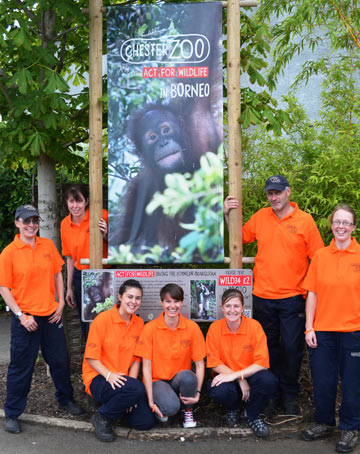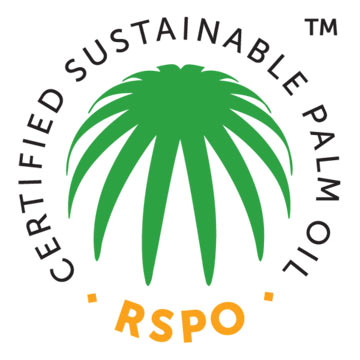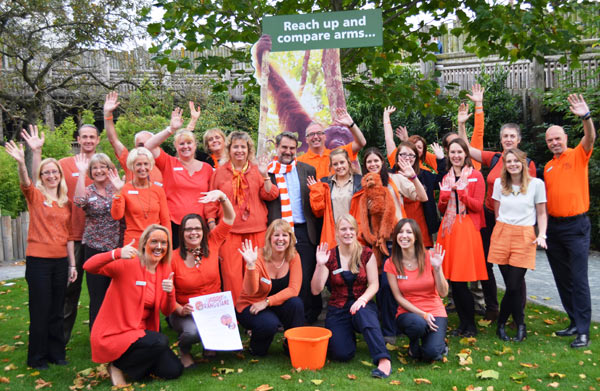UK’s Chester Zoo raises funds and awareness for reforestation project in Borneo

A pair of orphaned orangutans in Borneo. Many orangutans have become orphaned across the island due to forest loss and conflict with humans. Photo by: Rhett A. Butler.
If you see people wearing orange this October, it might not be for Halloween, but for orangutans. Chester Zoo’s conservation campaign, Go Orange for Orangutans, kicks off this month for its second year. The campaign aims to raise money, and awareness, for orangutans in Borneo, which have become hugely impacted by deforestation often linked to palm oil plantations. While many zoos are content to just show off their animals and provide basic information on conservation issues, Chester Zoo, and its conservation arm Act for Wildlife, is walking the walk by striving to not only sell products with sustainably-certified palm oil, but also asking zoogoers to consider their own impact and get involved with saving species from extinction.
“The campaign has strong behavior change messages, targeting schools, businesses, individuals, and zoo visitors and staff, aiming to increase awareness of palm oil and influence consumers to buy products containing sustainably produced palm oil,” Scott Wilson, Chester Zoo’s head of Field Programs, told mongabay.com in an interview.
 Chester Zoo staff celebrating Go Orange for Orangutans. Photo courtesy of Chester Zoo. |
Wilson says that “rapid and unregulated” palm oil production in countries like Indonesia and Malaysia has resulted in large-scale deforestation, threatening numerous species including Asia’s only great ape, the orangutan. Recent research has found that Indonesia is now suffering from the highest forest loss in the world, eclipsing even Brazil. Meanwhile, Malaysia has the highest rate of forest loss in percentage terms from 2000-2012.
Still, Chester Zoo believes that boycotting palm oil altogether is not the answer, but instead supports the Round Table on Sustainable Palm Oil (RSPO)’s efforts to promote the use of sustainable palm oil. Since palm oil is the world’s highest-yielding oil crop, Wilson says switching from this crop to any other would also prove environmentally destructive.
“If we were to stop using palm oil we would have to grow more coconuts, olives, sunflowers etc. to meet demand, leading to more land being converted to agriculture.”
The Orange for Orangutans campaign will give 100 percent of its donations to a reforestation project led by a local NGO in Malaysian Borneo, HUTAN.
“Restoring native vegetation will help not only orangutans but also gibbons, squirrels, tree shrews, tarsiers, slow loris and many other species,” said Wilson.
As for the roles of zoos and conservation in general, Wilson says “there is a general lack of awareness of the role zoos play in conservation and environmental education.”
“Zoos have access to large audiences and good zoos will engage this audience with the aim of increasing conservation awareness or influencing behaviour change for positive conservation impact,” he added. Chester Zoo was the first zoo in the UK to have the International ISO 14001 standard for environmental management and spends over $1.5 million a year on conservation projects.
“I’m not sure that makes zoos ‘activist groups,’ perhaps more ‘conservation ambassadors,’ but zoos can definitely be major agents for promoting positive actions for conservation,” Wilson said.
INTERVIEW WITH SCOTT WILSON OF CHESTER ZOO
.600.jpg)
School children celebrate Go Orange for Orangutans. Photo by: Chester Zoo.
Mongabay: Will you tell us about your up-coming Go Orange Campaign?
Scott Wilson: Go Orange for Orangutans is a campaign with two main aims. 1) To raise the awareness of orangutan conservation issues, particularly the threat of palm oil and how consumers in the UK can help, and 2) to raise funds to support the conservation of orangutans and their forests in Borneo.
Last year over 100 schools, businesses, and individuals took part and raised over £13,000 to allow HUTAN-KOCP, our partners working in the Kinabatangan region of Sabah, to buy camera traps. These were used to carry out a research project, which has since been published (Ancrenaz et al., 2014), into the effects of deforestation on orangutan movement. Our supporters were provided with information packs and undertook a huge range of activities including wearing orange, dying their hair orange, dressing in orangutan suits, selling wristbands, raffle tickets and orangutan artwork, holding raffles, baking contests, orange discos and sponsored walks, turning websites or logos orange, and having orangutan themed school dinners and pub menus.
This year we are aiming to reach even more people. The campaign has strong behavior change messages, targeting schools, businesses, individuals, and zoo visitors and staff, aiming to increase awareness of palm oil and influence consumers to buy products containing sustainably produced palm oil. Fundraising packs contain information about palm oil and how consumers can make sustainable choices and during October our Zoo Rangers will be on hand to spread the word to zoo visitors.
The money we raise will be spent on reforesting degraded areas, helping to alleviate habitat fragmentation, establish wildlife corridors, increase food availability for wildlife and help improve water quality. All seedlings for this project will be sourced from two nurseries that are operated by local communities. Restoring native vegetation will help not only orangutans but also gibbons, squirrels, tree shrews, tarsiers, slow loris and many other species.
Mongabay: Why is Chester Zoo and its conservation campaign group, Act for Wildlife, focusing on palm oil?

Pie for the Go Orange Bake Off. Photo courtesy of: Chester Zoo.
Scott Wilson: Palm oil is an edible vegetable oil derived from the fruit of oil palm trees. It has a multitude of uses and is found in approximately 50 percent of the food in our supermarkets. Oil palm trees are highly productive which has made them an important agricultural crop in many developing countries. The demand for palm oil has driven rapid and unregulated expansion of oil palm plantations in developing countries. This has had huge negative impacts on the biodiversity of some of the most unique areas of our planet and made unsustainable palm oil production one of the biggest issues facing conservationists today. Around 85 percent of the world’s palm oil is produced in Indonesia and Malaysia and vast areas of rainforest have been cleared to make way for oil palm plantations. These forests were once home to orangutans, tigers, elephants, rhinos and many other endemic species but oil palm plantations contain a fraction of the flora and fauna of native forests. Clearing forests also releases greenhouse gases, contributing to climate change, and plantations often contaminate rivers with fertilizers and industrial waste.
There is an urgent need for palm oil to be grown and managed sustainably. We support the work of the Round Table on Sustainable Palm Oil (RSPO) and those companies who choose to source Certified Sustainable Palm Oil (CSPO) from it. We believe that sourcing CSPO through the RSPO is the responsible choice and will drive demand for sustainable production. At Chester Zoo we have committed to using and selling only products made from sustainable palm oil and through our Go Orange campaign we want to raise awareness of palm oil amongst zoo visitors and the general public and encourage them to change their own behaviors.
Mongabay: Why is sustainable palm oil the answer and not simply boycotting palm oil altogether?

Deforestation for palm oil in Malaysian Borneo. Photo by: Rhett A. Butler.
Scott Wilson: A good question and something that is a source of considerable confusion about palm oil and which has triggered much debate, although the general consensus is that unsustainable palm oil use is not an option. Our beliefs mirror those of the RSPO and also of our field partners working in Borneo–if we were to stop using palm oil then we would need to find an alternative to supply the global demand for edible vegetable oils. Whilst there are plenty of alternatives available palm oil has the highest yield i.e. it produces the most oil per square kilometer. Growing palm oil is therefore the most efficient use of land, producing twice as much oil as coconuts and over thirty times as much oil as maize. It is also one of the most versatile oils and is used in a wide range of products including margarine, confectionary, soap, shampoo, lipstick, as industrial lubricant, as cooking oil and even as biodiesel. If we were to stop using palm oil we would have to grow more coconuts, olives, sunflowers etc. to meet demand, leading to more land being converted to agriculture.
Mongabay: How is Chester Zoo working to use and sell only products made from RSPO-certified palm oil?
Scott Wilson: We are committed to eradicating the use and sale of products which are obtained from unsustainable sources within Chester Zoo, in particular palm oil. We are in the midst of carrying out a systematic audit of palm oil in our supply chain and informing all of our manufacturers and suppliers of our palm oil procurement policy. We are auditing all products used and sold on site to identify palm oil content and auditing all manufacturers for their company policy and commitment to sourcing sustainable palm oil.
We will support manufacturers who are working to achieve 100 percent sustainable palm oil by accepting and promoting products that contain CSPO if the manufacturer’s policy is to use only CSPO throughout its product range by 2015. We will conduct annual audits and reviews of manufacturers’ policies to ensure continued compliance and reassess our own policy by 2015 to decide our position on non-compliant companies.
Mongabay: What can people do to ensure products they buy with palm oil are only made from sustainable sources?
 Logo for the RSPO. |
Scott Wilson: Palm oil appears on ingredients lists under dozens of different names so it can be hard to tell if what you’re buying contains palm oil or not. This will change in 2015 when food products containing palm oil will have to be clearly labelled in order to be sold in the European Union.
The best way to make sure the products you buy contain only sustainable palm oil is to look out for the RSPO logo. Many supermarkets and brands also have their own commitments to sustainable palm oil so check the palm oil policy of your local supermarket and check the packaging before you buy! There is also lots of information about palm oil online and several organizations provide advice on which products and brands have committed to use only sustainable palm oil.
Mongabay: Zoos aren’t usually thought of as activist groups. Do you think this view should change?
Scott Wilson: I think “activist group” has lots of negative connotations associated with it, but I agree that there is a general lack of awareness of the role zoos play in conservation and environmental education.

Zoo staff celebrating Go Orange for Orangutans. Photo courtesy of: Chester Zoo.
Chester Zoo’s mission is to be a major force in conserving biodiversity worldwide. We provide over £1 million of funding to field conservation projects each year. We also participate in numerous conservation breeding programs for threatened species and our staff work closely with partners worldwide to share knowledge and expertise. Our dedicated Discovery and Learning Team engage and inspire our zoo visitors, raising awareness of how they can change their behavior to benefit wildlife. They also work with our field projects, developing materials and campaigns to carry conservation messages to local communities and encourage them to preserve their natural heritage. Finally, we try to lead by example wherever possible. All fish used and sold at Chester Zoo is certified as sustainable by the Marine Stewardship Council, all our tea and coffee is Fairtrade and now we are in the process of making sure all our palm oil is sustainable too. We are also the first zoo in the UK and only the second zoo in Europe to be awarded the ISO 14001 standard for environmental management.
Zoos have access to large audiences and good zoos will engage this audience with the aim of increasing conservation awareness or influencing behavior change for positive conservation impact. Many zoos also directly support field conservation and the European Association of Zoos and Aquariums was one of the organizations involved in lobbying the European Parliament for mandatory labeling of palm oil in food products. I’m not sure that makes zoos ‘activist groups,’ perhaps more ‘conservation ambassadors,’ but zoos can definitely be major agents for promoting positive actions for conservation.
Mongabay: Given the scale of threats facing wild species, do you think it’s time for zoos and aquariums to become more outspoken about the power of their visitors to mitigate environmental destruction?
Scott Wilson: Absolutely. The role that zoos have played in our society has constantly evolved, today conservation is the main objective of most zoos and they are increasingly devoting time and money to both field conservation and visitor education. If species are to be preserved then people need to start living more sustainably. This applies to communities harvesting wood or bushmeat from a national park in Africa, but equally to consumers in more developed countries who are, often unwittingly, fueling the exploitation of natural resources in biodiversity hotspots or contributing to global threats such as climate change. Zoos, as conservation organizations, need to have strong environmental management systems themselves but also utilize the opportunity to inspire and engage the zoo visitor in regards to environmental threats and actions that can be taken to reduce these.

Orangutan. Photo by: Rhett A. Butler.
Related articles

(05/19/2014) A quiet zoo revolution has also been occurring over the past twenty-five years. Rather than just stand by the sidelines as species vanish in the wild, many zoos have begun funding on-the-ground conservation efforts. This revolution signals a widening realization by zoos of the positive—and wholly unique—role they could play in combating global mass extinction. But are zoos doing enough?
Google, zoo to leverage ‘TV white space’ to monitor wildlife
(10/09/2014) Imagine watching a tiger stalk a sambar deer or catching a ghost-like glimpse of the rarely-seen saola—all from your desktop and in real time. Well, this may soon be possible under a new partnership with Google and the Zoological Society of London (ZSL), which will test TV white space to monitor zoo animals as a trial run for real-time filming life in the wild.
Photos: Czech Republic publicly burns confiscated rhino horns

(10/06/2014) Late last month, armed guards escorted officials marching 60 kilograms (132 pounds) of rhino horns to a pyre for burning. The event, at the Dvůr Králové Zoo in the Czech Republic, was the first public burning of rhino horns in Europe. The Czech Republic burned the horns, which came from a government stockpile as well as from past rhinos held at the zoo, in a bid to help conserve rhinos.
Infamous pet and zoo supplier lost 3,500 animals a week (photos)

(10/02/2014) Nearly five years ago, a seven month long investigation, led by PETA, into an exotic animal wholesaler finally came to a dreary end. Authorities raided U.S. Global Exotics (USGE) in Arlington, Texas, confiscating over 26,400 animals from 171 species and types, held in inhumane and unsanitary conditions. The raid would become one of the largest exotic animal seizures in U.S. history.
Animals bark, screech, and howl for action on global warming (PHOTOS)

(06/02/2014) On May 22nd, zoos and aquariums around the world creatively called for action on global warming. Dubbed ‘Show the Wild Face of Climate Change,’ the event involved over 70 institutions from 25 countries on all seven continents.














